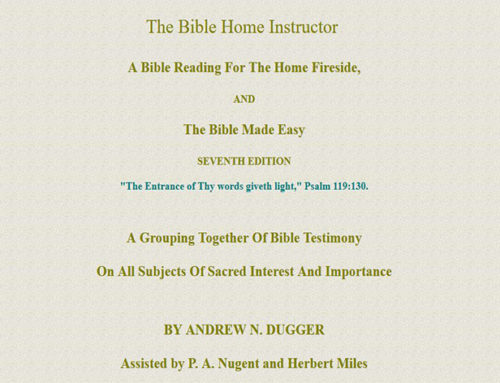The following facts show the manifest distinction between the moral and the ceremonial laws:
Moral Law
1. Was spoken by God. Deuteronomy 4:12.
2. Was written by God on “tables of stone,” Exodus 24:12.
3. Was “right,” “true,” and “good,” Nehemiah 9:13.
4. Was a law, “which if a man do, he shall even live in it,” Ezekiel 20:11, 13, 21.
5. Was a “perfect” law, Psalms 19:7.
6. Christ did not “come to destroy” it. Matthew 5:17.
7. He came to “magnify” it and make it “honorable,” Isaiah 42:21.
8. Every “jot” and “tittle” of this shall stand “till heaven and earth pass” away, Matthew 5:18.
9. Of this, Christ says, “Whosoever, therefore, shall break one of these least commandments . . . shall be called the least in the kingdom of heaven,” Matthew 5:19.
10. Was a “law of liberty,” James 2:12.
11. Is “established” through faith in Christ, Romans 3:31.
12. “Is spiritual,” Romans 7:14.
13. Is “holy,” and “good,” Romans 7:12.
14. Was “written with the finger of God,” and is called the “royal law,” Exodus 31:18; James 2:8.
15. Was proclaimed by Jehovah Himself “and He added no more,” Deuteronomy 5:22.
16. Is the “commandments of God,” which are brought to view in the third angel’s message (Revelation 14:12), and which will insure to those who observe them a “right to the tree of life,” Revelation 22:14.
Ceremonial Law
1. Was spoken by Moses, Deuteronomy 1:1-6.
2. Was written by Moses “in a book,” Deuteronomy 31:24.
3. “Was not good,” Ezekiel 20:25.
4. Was a law “whereby they should not live,” Ezekiel 20:25.
5. “Made nothing perfect,” Hebrews 7:19.
6. He “abolished” it, Ephesians 2:15.
7. He took it “out of the way” at his death. Colossians 2:14.
8. Was only “added till,” and passed away, when the Seed came, Galatians 3:19.
9. Of the other, the apostle said, “We gave no such commandment” that ye should “keep the law,” Acts 15:24.
10. Was a “yoke of bondage,” Galatians 5:1.
11. “Was our schoolmaster to bring us unto Christ,” Galatians 3:24, 25.
12. Is “the law of a carnal commandment,” Hebrews 7:16.
13. Is “enmity against us” and “contrary to us,” Ephesians 2:15; Colossians 2:14.
14. Was the “handwriting of ordinances,” Colossians 2:14.
15. “Was ordained by angels in the hand of a mediator,” Galatians 3:19.
16. Is “the law of commandments contained in ordinances,” Ephesians 2:15, “a shadow of good things to come,” Hebrews 10:1, and was disannulled “for the weakness and unprofitableness thereof,” Hebrews 7:18.


Leave A Comment